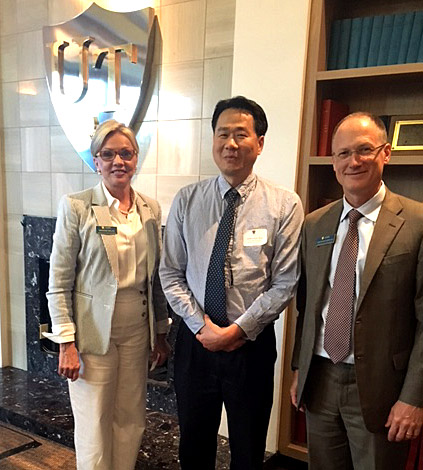A University of Toledo researcher is taking a closer look at how a common food additive could reverse brain cell damage caused by Alzheimer’s disease.
Midi-GAGR is a byproduct of low acyl gellan gum, a commonly used gelling agent in foods such as icing and pudding, that has been shown in lab testing to reverse the effects of Alzheimer’s disease in mice.

Dr. Joshua Park, center, posed for a photo with Marianne Ballas and Dr. Christopher Cooper, executive vice president for clinical affairs and dean of the College of Medicine and Life Sciences, after receiving a $50,000 grant through the UT Medical Research Society.
Alzheimer’s disease is a degenerative condition affecting the intracellular network of brain cells causing neurofibrillary tangles to form inside the cells inhibiting their function and leading to their death. This damage leads to memory and cognition loss.
Midi-GAGR reverses damage to the cell network and reduces the level of proteins that generate the neurofibrillary tangles, which allows the brain to begin repairing the building blocks and signalers, improving memory and cognition.
“In animal lab tests, we have seen improvement in both behavior and in the physical structures of the brain,” Park said. “There is still much more testing to do before we will be approved for human trials, but it should move fairly quickly as low acyl gellan gum has already been approved for human consumption by the FDA.”
The Midi-GAGR treatment is administered through a nasal spray, which is significant as many people with Alzheimer’s lose the ability to swallow as the disease progresses. It also metabolizes slowly, which means it would only have to be administered once daily.
“We also have found the medication actually crosses into the brain to treat cells directly,” he said. “This is important because most medications are processed in the circulatory system and never actually make it to the brain.”
This is the second award given by the Medical Research Society since its founding in 2014. The society consists of 20 community and medical leaders with an interest in supporting UT’s junior faculty research.
“Everyone in the room felt a personal connection to Dr. Park’s research because we all know someone who has been touched by Alzheimer’s disease,” said Marianne Ballas, owner of Ballas Buick GMC and a founder of the UT Medical Research Society. “We were impressed by his tenacity, and we are confident Dr. Park and his unique research will make a difference for patients and their families.”
“Receiving this grant is a great honor,” Park said. “But even more importantly, the support from the research society and to the Toledo community is motivating. It encourages me to work even harder to find answers for Alzheimer’s patients and their families.”
Park hopes to see a medication on the market within the next 10 to 15 years.
“My parents are getting older, and many of their friends are starting to see memory loss and early stages of Alzheimer’s,” he said. “It is my hope that this research will lead to treatments that will be available to patients in my parents’ lifetime.”
UT’s Office of Technology Transfer has filed a patent for the technology, which will provide intellectual property protection and allow Park to share his research with drug companies that could sponsor additional research in this area of study.